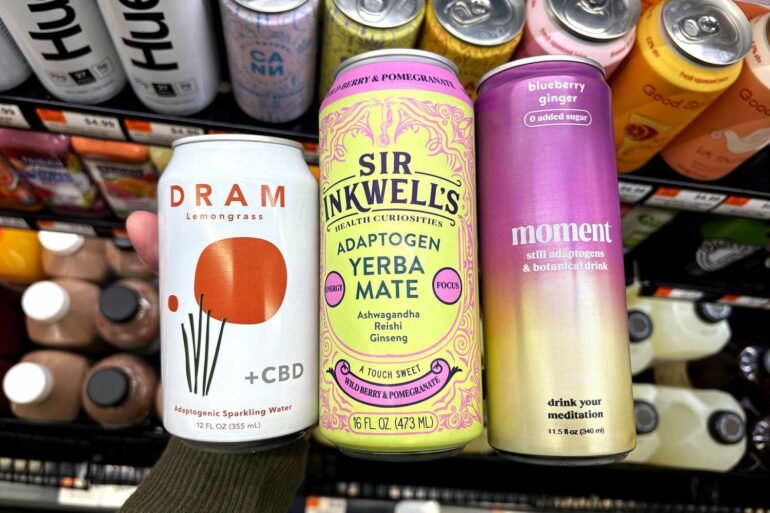:max_bytes(150000):strip_icc():format(jpeg)/Whats-So-Functional-About-This-Beverage-FT-BLOG0925-1146b3001c7f4584a061231f32aaa69f.jpg)
- Wellness drinks often highlight ingredients like reishi mushrooms, ashwagandha, and prebiotics, but the actual dosages in these beverages are typically unknown.
- While some studies suggest potential benefits such as stress relief, improved digestion, or increased focus, experts warn that side effects and medication interactions are possible.
- Functional drinks rarely contain therapeutic levels of their featured ingredients, and it’s often best to consult a doctor before adding them to your wellness routine.
If you tell me that a drink without alcohol can give me energy, sleep, better digestion, and/or make me insta-chill, you will have my attention. I’m one of many easy targets (or fools?) who have cracked open a functional beverage in an attempt to drink my way to wellness.
These nonalcoholic drinks claim to address specific health concerns, from enhancing immunity to boosting mental alertness. Even major soda companies like PepsiCo and Coca-Cola have entered the market, eager to capitalize on growing interest for “better-for-you” options.
The market, which was valued at $197.3 million in 2023 by market research company Fact.MR, is projected to hit $484 million by 2034. But are these drinks actually better for you? We talked to health experts and doctors about five of the most common ingredients found in these drinks.
9770880_224 / Getty Images
Reishi mushrooms
Reishi mushrooms (Ganoderma lucidum), also known as lingzhi, have glossy, reddish-orange caps that grow as wide as 14 inches across the base of living or dead deciduous trees.
They are part of a large cohort of plants and mushrooms known as adaptogens. Medical practitioners are studying them for their perceived ability to combat stress and boost wellbeing.
Reishi mushrooms have been used in Asian countries to treat infections for hundreds of years. In recent decades, they have been used as a way to boost immunity and fight inflammation.
There has also been positive research that reishi can be a helpful adjunct in the treatment of cancer, assisting in alleviating symptoms. Recently, studies have also demonstrated that reishi mushrooms may reduce anxiety, depression, and fatigue.
The good and promising
Adaptogens like reishi mushrooms “may help you feel a sense of calm,” says Sarah Pflugradt, PhD, a registered dietician, nutritionist, and food science expert.
Reishi mushrooms and other adaptogens can offer “stress relief or resilience to recurring stressful episodes.”
The potentially bad and ugly
There’s a big “but” here, especially with wellness drinks that tout reishi mushrooms as an ingredient.
“The dosage of functional ingredients like reishi are typically a big mystery,” says Pflugradt. “With some common ingredients, like caffeine, fiber, or protein, they might be listed on the bottle or can, but most functional blends are considered proprietary and actual amounts are unknown to the consumer.”
There are also potential side effects, says Dr. Neha Bhatt, a licensed naturopathic medical doctor at the Sonoran University of Health Sciences Medical Center.
“Reishi has mild blood-thinning effects and could increase bleeding risk when combined with anticoagulants,” says Bhatt.
ruhrpix / Getty Images
Prebiotics
Prebiotics are nondigestible compounds in food that can promote the growth of beneficial microorganisms in the gastrointestinal tract. In essence, prebiotics act as “food” for healthy gut bacteria, which can improve digestion and support the immune system.
Foods that contain high levels of prebiotics are almonds, bananas, whole grains, cabbage, and jicama.
If these options don’t sound as appealing as, say, soda, you’re in luck. Sales of prebiotic sodas have surged. Even the big brands are joining in on the trend—PepsiCo recently snapped up Poppi, one of the most prominent brands in the space, for close to $2 billion.
The good and promising
“Prebiotic sodas are all the rage right now and are marketed for their gut health,” says Pflugradt. “These sodas use a blend of different fibers that are believed to feed good gut bacteria.”
The potentially bad and ugly
Pflugradt warns that people with gut issues should consult a doctor first.
“Those who suffer from inflammatory digestive conditions should stay away from prebiotic sodas because of the type of fiber used,” she says. “These types of drinks can also contain sugar alcohols, which can exacerbate uncomfortable digestive systems.”
Azay photography / Getty Images
Ashwagandha
Ashwagandha (Withania somnifera) is an evergreen shrub that grows to about 30 inches in height and has small, green-yellow, bell-shaped flowers. Native to the Middle East, African regions, southern Europe, and the Indian subcontinent, it’s used as an adaptogen in Ayurvedic and Unani medicine.
A member of the nightshade family, its name translates to “smell of the horse” in Sanskrit. However, this stinker has been shown to potentially increase strength and energy levels, improve sleep, and relieve anxiety.
The good and promising
“Ashwagandha is a well-known adaptogen linked to reduced cortisol and lower feelings of stress,” says Caroline Thomason Bunn, a registered dietitian, diabetes educator, and nutritionist based in Washington, D.C. “Some drinks add it for its ‘chill-out’ effects.”
The potentially bad and ugly
To actually chill out, you need a much higher dose of ashwagandha than what functional drinks typically offer, says Bunn.
Plus, even at small doses, ashwagandha shouldn’t be consumed by certain people.
“Just because something’s natural doesn’t mean it’s risk-free,” says Bunn. “Adaptogens like ashwagandha can affect thyroid hormones or blood pressure. If you’re on any medication, it’s best to check with a doctor before sipping on a functional brew.”
LukasLt / Getty Images
Rhodiola
Rhodiola (Rhodiola rosea) is a perennial flowering succulent with fleshy, grey-green leaves and bright yellow or pink flowers. This adaptogen-nootropic hybrid grows in colder areas of Europe, Asia, and North America. Its root, which has more than 140 active ingredients, has been used for centuries in Russia and Scandinavia to increase energy and alleviate depression and anxiety.
The good and promising
Recent studies show that rhodiola can decrease stress-induced burnout and chronic fatigue.
Dr. Karen D. Sullivan, a board-certified neuropsychologist who founded Pinehurst Neuropsychology in North Carolina, says that rhodiola has been linked to stress reduction.
The potentially bad and ugly
The plant’s active properties can be dangerous, even in small doses.
“It may destabilize mood in individuals with bipolar disorder,” says Sullivan.
Bhatt says that “rhodiola may be stimulating for some and could interfere with SSRIs or anti-anxiety medications.”
Frank Rothe / Getty Images
L-theanine
L-theanine is a non-protein amino acid found primarily in tea leaves and mushrooms. Studies have shown that it can ease stress and anxiety and boost immunity.
L-theanine is classified as a nootropic, which is a broad category of natural and synthetic substances purported to enhance cognitive functions like memory, focus, and creativity. Nootropics include prescription medications like Adderall and Ritalin, and plants like ginkgo biloba and ginseng.
The good and promising
“Found naturally in green tea, L-theanine is known for its calming and focus-enhancing effects,” says Bhatt. “This one is also more realistically available in drinks. Effective amounts start around 100 to 200 [milligrams], and that can be achieved in a single functional beverage.”
The potentially bad and ugly
Sullivan agrees that L-theanine can be effective at the doses typically offered in wellness drinks. But it may be counterproductive for some.
“L-theanine may increase drowsiness when taken alongside anti-anxiety drugs,” says Sullivan.
The bottom line
As with anything, there’s a good side and bad side to ingredients purported to help hack your way to health.
“Functional beverages can be a fun and tasty way to introduce people to wellness concepts,” says Bhatt. “And some consumers report subjective benefits, even if the dosing is low. That placebo effect can still be powerful.”
The biggest issue is the sizable gap between what these ingredients can deliver at the dosage found in a functional drink, and what that drink may promise customers.
“Many of these beverages don’t contain therapeutic levels of ingredients, so the advertised benefits may not materialize,” says Bhatt. “Also, some products mix multiple herbs without listing exact doses or standardizations, making it hard to assess safety or efficacy.”
Being informed is essential. It’s easy to get sidetracked by buzzwords. It’s always important to consult a doctor before you begin any new wellness routine, especially if you’re on medication or have underlying health issues.
Kathleen Willcox
2025-09-11 14:01:00

